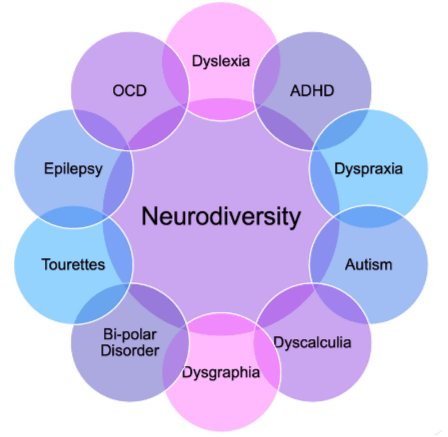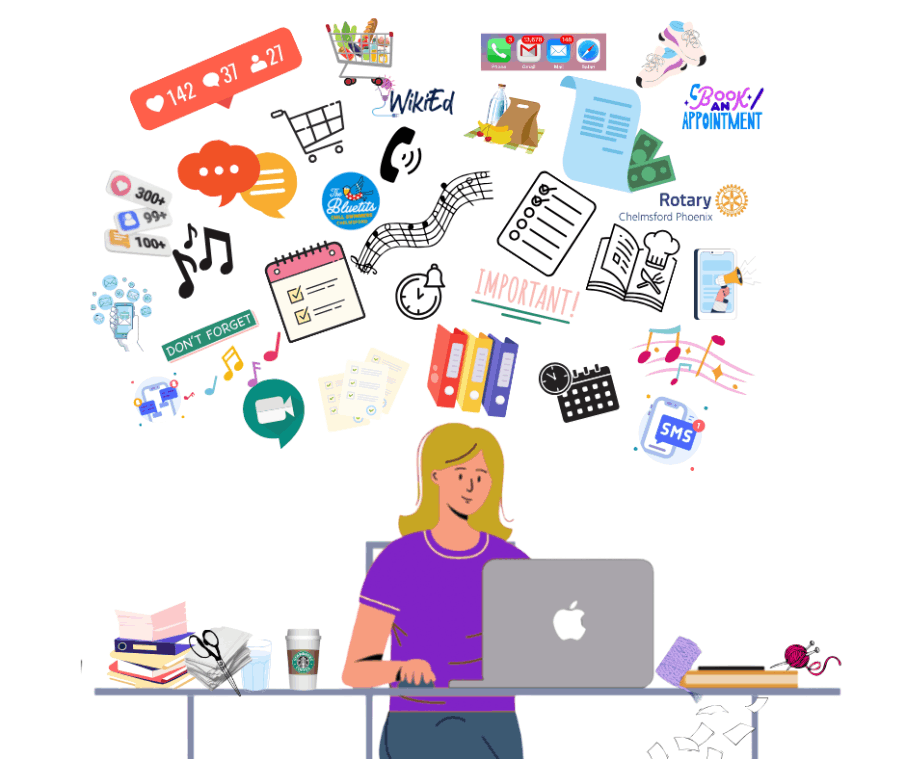
Workplace Strategy Coaching
Neurodiversity Coaching
ADHD Coaching
Menopause Coaching

Neurodiversity Coaching
ADHD Coaching
Menopause Coaching
"A massive thank you to a positive person who
has made a huge difference in my life."
Coaching is working with someone who can help you understand how you think differently and can work with you to help improve your weaker areas.
“Different people have different wiring”
Oxford NHS Trust
Coaching is your opportunity to discover the strengths and weaknesses in your executive skills, which are the cognitive skills that help you manage your behaviour and get things done.
Coaching is a conversation where we discover your struggles and build strategies to help you improve these areas. We explore your strengths and how you can maximise these to drive yourself to achieve your goals.
Coaching is your opportunity to become the best you can be. While our primary focus is to help you improve your work skills, you are one person, and we will find strategies to improve your life skills.
Your coaching sessions are structured around goals YOU set. We will look at an area you want to improve and set a goal for measuring improvement.
I don’t give you solutions that work for everybody else. Instead, we work together to make small changes that will work for you — strategies that build upon what you are already doing well.
We have a conversation to explore your difficulty, what's already working and what needs to be improved.
I will help you to understand why the things you have previously tried haven’t worked.
We will adapt and learn how to introduce them in a way that will stick in future.
I will introduce you to strategies that you can try and help you understand how or why they can work.
Together, we will work out how you will try to implement these strategies in your existing way of working and how we will measure success.
We finish by reviewing the changes we have discussed and the strategies introduced.
We set goals for introducing these changes and measuring their effectiveness over the next 2 or 3 working weeks.
Scheduling, structuring your time effectively, accurately estimating time and managing deadlines
Cultivating the drive to begin a task, setting goals to create direction, i recognising and reducing behaviours or thoughts that lead to delays
Tracking tasks and progress, resource allocation, task breakdown, aligning tasks with objectives, adaptability, delegation
Analytical and critical thinking, decision-making, creativity, logical reasoning, evaluation and reflection
Physical and digital organisation, managing and maintaining documents, clutter management, creating routines and habits to streamline daily activities
Adapting to new conditions, challenges or changes in plans. Being receptive to new ideas, guiding and supporting others through changes
Identifying and removing distractions, active listening, mental clarity, task segmentation, single-tasking
Setting clear, achievable goals and working towards them in a diligent, motivated way.
Recognising and understanding your own emotions in the moment, resisting the urge to react impulsively or emotionally in stressful situations
Recognising and understanding your own emotions in the moment, resisting the urge to react impulsively or emotionally in stressful situations impulses and acting appropriately
Neurodiversity of different types comes with different challenges, including executive function challenges. Every person is different and will have different strengths and weaknesses, forming what is known as a “spikey profile.”
During the initial coaching session, we discuss the areas of concern, identify strengths and weaknesses, and examine how the individual is already using strategies to support their weaker areas. We use these as a foundation for success.
Here are some examples of areas that have been the focus of previous clients.
Dyslexia: Difficulty note taking, reading & writing large chunks of information, proofreading, organisation, time management, and working memory.
Dyspraxia: Movement and co-ordination, organisation, following instructions, emotional control
ADHD: Hyperactivity, attention, mental health, concentration & focus, time management, working memory, organisation, social challenges
Autism: Communication, social challenges, flexibility, time management, planning & prioritising,

Geoff is Autistic and has struggled with many changes in the workplace. As an older man, he was quite happy working on paper but has faced challenges moving all of his work online using many different systems.
Over several months, we explored his processes and how he could make them fit comfortably with the online systems without feeling that everything was beyond him.
Unlike his paper diary, Geoff also had time management problems and now finds that his online calendar dramatically helps with this. He no longer misses client meetings or runs out of time to complete daily tasks. His Autistic brain loves time blocking, which has been a big help.
Nerini is aware that her dyslexia makes her slow to process information. She misses things when note-taking and constantly worries that writing and proofreading take too long, and she misses mistakes.
Examining note-taking strategies, Nerini found that mind mapping worked for her. Taking notes with visible links suits her preferred visual learning style. She adds abbreviations and symbols to form “shorthand” and finds it easier to take notes now.
We explored some new proofreading strategies but also worked on Nerini’s mindset so that she focused on the positive feedback she received from her team. Her confidence in written work has increased, and she feels less stressed.
Francis has dyscalculia; their role involves using a tracking sheet, which is just a “sea of numbers”. They have made many mistakes in inputting information, which has knocked their confidence.
We went through the input process and what kind of information would typically need to be input. Together, we made a “cheat sheet” explaining how the different information should be input. We also devised a strategy for inserting delimiters to help Francis easily understand the values.
We looked at how Francis could structure their day to eliminate mistakes—completing complex tasks when working at their best and taking breaks before checking for accuracy.

ADHD coaching helps clients with ADHD achieve personal goals by addressing the challenges they face in all aspects of life.
Coaching provides individualised support to improve organisation, focus, motivation, and accountability
Coaching helps people with ADHD learn how their symptoms affect their daily lives.
During a session we will use questions that help you to reflect and establish where you want to change your life.
Small changes over time can help form new, positive habits to help overcome the challenges that your ADHD brain faces when completing everyday tasks.
We will look at tools such as apps and software which can help you to stay on track with organisation, time management and concentration and will benefit you across all aspects of your life.
Personalised Approach:
I work with your specific needs, goals, and challenges.
Practical Strategies:
Together, we look at actionable strategies, like breaking down tasks, creating routines, and managing distractions.
Accountability:
I provide encouragement and structure, helping you stay on track with your goals.
Skill Development:
We address your executive function challenges, such as planning, prioritising, and emotional regulation.
Supportive Partnership:
I provide a non-judgmental space to explore challenges and celebrate progress.
Improving focus
Minimising procrastination
Managing time effectively
Organising personal and professional spaces
Developing better communication skills
Improving interpersonal skills
Building routines and habits
Enhancing self-esteem and confidence
I understand the nuances of ADHD and work collaboratively with you to create sustainable systems that work.

Menopause coaching aims to support women through the physical, emotional, and mental changes associated with menopause.
I help clients better understand this transition, empowering them with tools and strategies to navigate symptoms, manage stress, and confidently embrace this new phase of life.
Clients who have completed menopause coaching with me tell me they feel more confident and able to reconnect with their sense of purpose.
Coaching is working with someone who can help you understand the changes you have experienced and can work with you to help strengthen your strategies and performance.
“Menopause affects the brain as much as it affects the ovaries”
Dr Lisa Mosconi
Coaching allows you to explore the changes and why you struggle to manage your behaviour and get things done.
Coaching is a conversation in which we develop strategies to help you improve. We also explore your strengths and how to maximise them to drive yourself to continue achieving your goals.
Coaching is your opportunity to become your best self. While our primary focus is helping you improve your work skills, you are one person, and we will find strategies to improve your life skills.
"I seemed to lose myself and I didn’t know the person I had become, I couldn’t cope with my job anymore. I felt like giving up.
Coaching helped me with strategies that allowed me to do my job well again and helped the new me to thrive"
The disabilities covered under the Access to Work scheme can include mental health conditions and learning disabilities as well as physical disabilities. Many clients we see who have Access To Work grants have conditions such as dyslexia, dyspraxia and ADHD.
The grant can help fund any equipment not generally needed for your job to help you with your disability (such as ergonomic equipment, standing desks, etc.). It also covers assistive technology software/hardware and training in how to use it. Workplace coaching is often recommended as part of your Access to Work assessment. I offer workplace coaching and assistive technology training through Access to Work.
Visit the government website for information about how to apply for an Access to Work grant.
You can also download my Access to Work guide from the Resources page.
If you already have access to a work grant, I can provide a quote - you don't have to go with the recommended provider.
Please get in touch with me for a quote.
Training@wiki-ed.com
Assistive technology training will help you learn your new software and how it can best help you in your role. I offer personalised training to suit your needs.
I am qualified to provide training on all assistive technology software, both Windows and Mac-based.
Please get in touch with me for a quote.
Training@wiki-ed.com
Angela, London
Nisha, Chelmsford
No Code Website Builder
Find us online